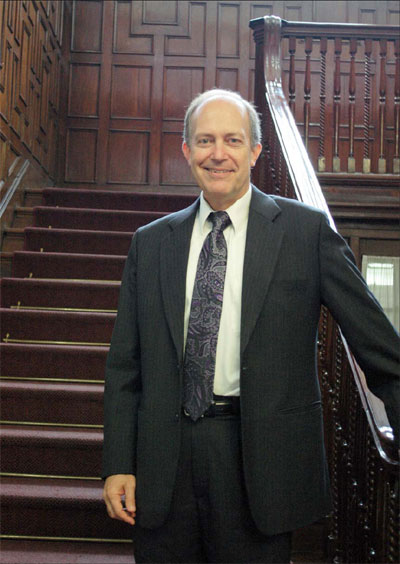Building bridges
Updated: 2012-04-20 07:56
By Mary Katherine Smith (China Daily)
|
||||||||
|
Robert Griffiths' extensive travels in China have helped him in his mission. Provided by American Chamber of Commerce-Shanghai |
US diplomat says it's all about interaction
With days full of meetings involving consular services, other diplomats and US companies, the life of United States Consul General in Shanghai Robert Griffiths may seem repetitive, maybe even mundane.
But Griffiths, who first came to China in the 1980s and is now on his third tour and 12th year here, uses experience and knowledge of the country and region to his full advantage.
Griffiths' interest in China began in university when he pursued a major in Asian studies in a class called "Asian Political Thought".
"The first day we walked into class and the professor was Mongolian," he says.
"He said 'I know that you're here to study all of Asia's political thought, but there's really only one kind of political thought that's worth studying and that's Chinese political thought'."
During the semester-long course, they never got past 200 BC.
"That kindled my interest in Chinese history," he says. "Being in China you can't go any place that doesn't have a special claim to some facet of Chinese history, because there's so much of it."
And Griffiths has tried to see as much of that history as possible, having been to every Chinese province except for Hainan. This knowledge and interest has been crucial in helping him to reach out and help build bridges to share American values with his host nation.
"The most important thing that the consul general does is to build bridges between the US and China," he says. While the consulate is involved with many different activities, all that work is important.
"All of us who work here recognize how those bridges benefit everybody on both sides. We're better off when we're interacting with China; China's better off when interacting with the US."
In the almost 30 years he has spent serving in the region, Griffiths has seen drastic changes in China's landscape.
When he first visited China in the 1980s, "all I really remember is that we were out on rural roads and the only vehicles we saw were trucks that only had one front wheel", he says.
Nowadays, cars are much more modern, but "I think the biggest change has been that everything is available and it's really very expensive".
Griffiths also finds himself on the road much more now compared with his tour in Shanghai from 1997 to 2000.
"Back then Shanghai was just getting going, and we were very busy interacting with Shanghai," he says.
Now Shanghai is very well established so the focus is on second-tier and developing cities.
"We feel we get more bang for the buck out on the road than we often do in a city as well developed as Shanghai."
The trips to surrounding cities and provinces are a meaningful way to show the US interest and commitment to China.
"All of that is important not only just to promote our visibility and interests, but to model our values."
One relatively new aspect is the consulate's online presence and blogging of the different events and trips. It is one way for the consulate general and the US to be more approachable.
"We try to blog and show different aspects of the work that we're doing, and it is fun to do that kind of stuff," Griffiths says. "The US is an open society; we believe in free flow of information and transparency. I want to reflect those values and be a good example of them when I'm out and about."
Griffiths says one of the most important parts of his job is making sure that he represents the US in China and that the Chinese people know that Americans respect and want to work with them as friends.
"We're pretty straightforward, pretty down to earth," he says of Americans and Chinese. "And I find it very easy to make Chinese friends, and that makes it a great pleasure to be in China."
While Griffiths has spent ample time in both Shanghai and Beijing, he does prefer one to the other.
"We had a wonderful time in Beijing, and it has a lot to offer," he says, but his vote goes to Shanghai.
"I am still American, and Shanghai just has a more international flavor. It's just such an exciting, world city, as well as being a Chinese city."
China Daily

 Relief reaches isolated village
Relief reaches isolated village
 Rainfall poses new threats to quake-hit region
Rainfall poses new threats to quake-hit region
 Funerals begin for Boston bombing victims
Funerals begin for Boston bombing victims
 Quake takeaway from China's Air Force
Quake takeaway from China's Air Force
 Obama celebrates young inventors at science fair
Obama celebrates young inventors at science fair
 Earth Day marked around the world
Earth Day marked around the world
 Volunteer team helping students find sense of normalcy
Volunteer team helping students find sense of normalcy
 Ethnic groups quick to join rescue efforts
Ethnic groups quick to join rescue efforts
Most Viewed
Editor's Picks

|

|

|

|

|

|
Today's Top News
Chinese fleet drives out Japan's boats from Diaoyu
Health new priority for quake zone
Inspired by Guan, more Chinese pick up golf
Russia criticizes US reports on human rights
China, ROK criticize visits to shrine
Sino-US shared interests emphasized
China 'aims to share its dream with world'
Chinese president appoints 5 new ambassadors
US Weekly

|

|







